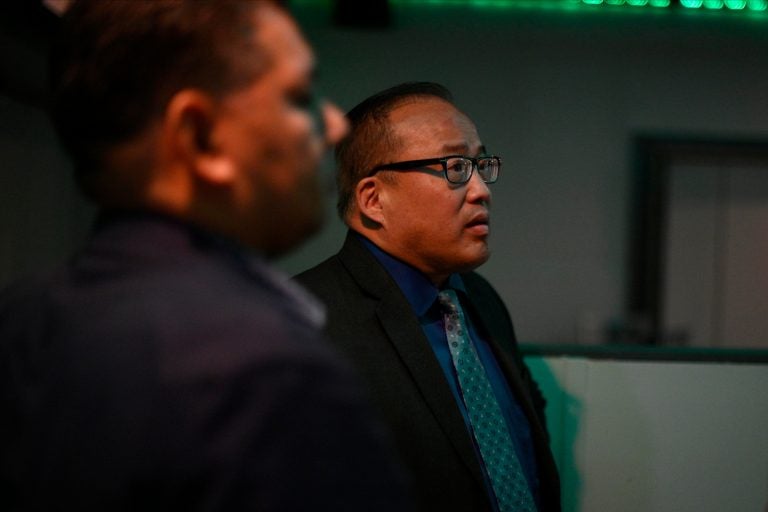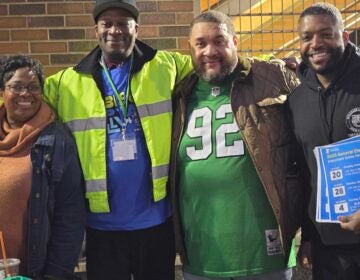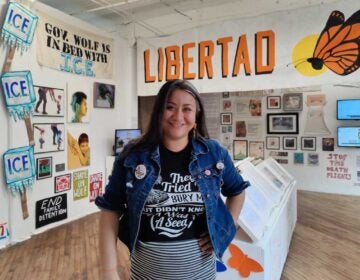Councilmember David Oh says he speaks for Asian Americans. Did that help him win?
Oh claims he’s able to speak to and for the Asian American community in Philadelphia. But does that claim check out? And if so, was it the reason for his election night win?

Incumbent Councilman at-Large David Oh follows the results at Dimensions Sports Bar in Northeast Philadelphia. (Bastiaan Slabbers for WHYY)
Councilmember David Oh has held his at-large Republican seat for two terms. But this election season, he narrowly scratched out a victory.
Over the past few years, Oh’s lost a lot of support within his own party. Plus, he finished last in the Republican primary in May, which means that Tuesday, he relied much more heavily on centrist Democrats to cross party lines and vote for him in the general election.
The other voter base he seemed to be counting on? Asian Americans.
Oh became the first Asian American to be elected to Philadelphia’s City Council in 2011. Helen Gym, a Democrat and community organizer, became the second when she won her seat in 2016. At the time, he told the Inquirer his victory was “a point of pride for Asian Americans in Philadelphia.”
Just this past April, Oh visited the University of Pennsylvania to speak at an event co-hosted by the Penn College Republicans and the Asian Law and Politics Society (ALPS). “I represent all my constituents equally, regardless of race,” he told the students there. “The difference is, I make sure Asian voices are not ignored.”
Oh claims he’s able to speak to and for the Asian American community in Philadelphia. But does that claim check out — and if so, was it the reason for his election night win.
Past policies
It’s true that much of Oh’s work has been focused on Asian and Asian American issues.
Some of that work has gone international. In 2016, he traveled to South Korea to pitch Philadelphia as a travel destination and site for Korean and Korean-American community investment. And earlier this year, he offered an official apology to the Chinese ambassador to the United States after the drunk-man-stolen-thumb incident at the Franklin Institute.
But it extends to his local work, too. He’s opposed the soda tax, claiming that it hurts low-income consumers, and criticized the city’s 11 p.m. closing ordinance on the basis that it unfairly targeted Chinese takeout restaurants.
Oh was also a vocal opponent of Cindy Bass’ stop-and-go bill, particularly an early version which would have required corner store owners to take down bulletproof glass barriers between cashiers and customers. Many Asian business owners wanted to keep the bulletproof glass in their stores, though some Black customers said they felt dehumanized by it. The debate exacerbated existing racial tensions, but Oh refused to back down, insisting that the bill unfairly targeted Asian-owned businesses.
But not all Asian Philadelphians agreed. Nancy Nguyen, executive director of nonprofit VietLEAD, told Philadelphia Weekly the debate was ultimately a “failure of City Council to represent both sides in a way that doesn’t just pit two sides against each other.” Which prompted the question: if Oh was listening to Asian American voices, whose? And at what cost?
“A very different kind of room”
Oh claims he’s capable of capturing the votes and the voices of the Asian American community. But if anything, his two terms have highlighted the fact that the Asian American community is often divided, constantly shifting, and far from monolithic.
Wei Chen, civic engagement coordinator of nonprofit Asian Americans United, pointed out that for most Asian American voters, the primary obstacle in their political involvement isn’t necessarily representation as much as access. New voting machines, a lack of translation/interpretation, inaccessible or distant polling locations, and other barriers can also keep Asian Americans from the polls.
Beyond that, Chen said, the concept of a singular Asian American voter interest might not exist the way Oh’s characterized it. “Asian American — it’s a really large category,” he added. “We should break down different ethnicities, different histories… East Asians’ immigration stories are different than Southeast Asians or South Asians.”
College senior Nikhil Lakhani is a board member of Penn’s Asian Law and Politics Society; he coordinated the event that brought Oh to Penn’s campus last spring. He’s also a registered Democrat.
Initially, Lakhani said, he invited Oh simply because Oh was a local Asian American political leader (ALPS invited Helen Gym as well; she was busy). But after the event, Lakhani said he realized the initiatives Oh supported — particularly as they related to business owners and Asian American communities — were more appealing than he’d thought. “I supported him,” Lakhani said. “I remember leaving that event and thinking, oh, he’s a really great asset on the council, I’m definitely going to vote for him [in the] next election.”
Lakhani emphasized that he didn’t support Oh simply because Oh is Asian American; for him, shared values are more important than shared identities. “I made my decision more because, to me, a diversity of viewpoints is important on the council … I felt that he was somebody who would look pragmatically at the issues,” he said.
Several Asian American voters WHYY spoke with yesterday echoed Lakhani’s perspective. Tina Liu said she “didn’t vote based on party, but based on policies [she] supports.” She voted for both Helen Gym and David Oh, she said, based in part because she thought they, as Asian American candidates, would be better able to speak to her needs. Tiffany Ni, a young Chinese American, was another registered Democrat who split her ticket to vote for Oh. Theresia Go, an elderly voter, wasn’t sure of her party affiliation but was confident in her Oh choice. “I vote him! A lot of people here [gesturing to indicate Chinatown] vote him.”
Other voters, like young mother Amy Zou, focused less on policy and more on their personal understanding of the candidate. “He is very youhao — friendly,” Zou told WHYY outside the polls. She voted for Oh, she added, as did many of her family members. “He’s a very good person.”
Glenn Hing, the majority inspector at one of Chinatown’s two polling locations, added that Oh “has good support here,” referencing the number of Oh supporters handing out pamphlets and posters Tuesday morning. “People support him because he supports businesses and because he’s sensitive to their concerns,” Hing added. “His name is out there — not just in Asian communities but in other communities as well. His support is pretty widespread.”
Oh told WHYY yesterday that there could be multiple reasons for his narrow victory: a changing electorate, false claims made by the “Republican machine” about his voting record, and attempts targeting his candidacy from both the left and the right. He also acknowledged that many of his supporters are not Republicans, and that part of his strategy between the primary and the general election was communicating with those supporters.
Mostly, he touted the diversity of his voter base. “If you look at this room, we have whites, people from the Northeast, Center City, we have Democrats, we have Asians, we have Muslims, we have African Americans, you know, we have LGBTQ — we have a very broad, very diverse group of people… I think that if you look at who’s in my room vs. who’s in [other Republicans’] room[s], you’re going to see a very different type of room.”
So what, exactly, pushed David Oh’s re-election bid as he barely squeaked to victory? Was it Republican turnout? Democrat crossover? Or was it the Asian American base he frequently mentions?
As an organizer pushing for voter engagement across the board, AAU’s Wei Chen isn’t sure. That’s because he still doesn’t see Asian Americans falling in a particular “bloc” on the political spectrum. “They are left, they are right, they are middle — it really depends on the candidate and the policies. It’s hard to, currently, it’s really hard to say where Asian Americans are [politically], or to give a final answer.”
WHYY is your source for fact-based, in-depth journalism and information. As a nonprofit organization, we rely on financial support from readers like you. Please give today.







